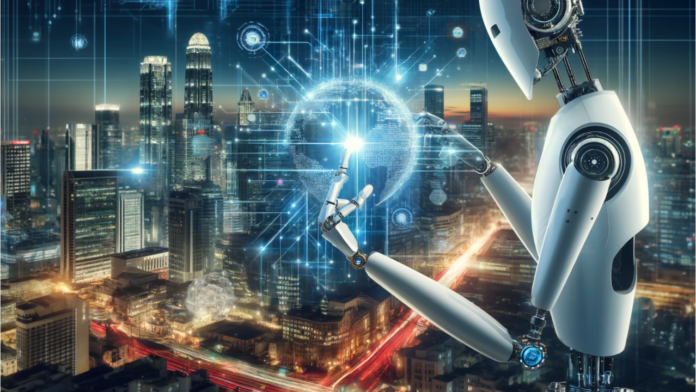In an age where the only constant is change, enterprises across the globe are finding themselves at a crucial crossroads. The digital revolution, spearheaded by Artificial Intelligence (AI) and Automation, is not just knocking on the door; it’s barging in, bringing with it the promise of unprecedented efficiency and the threat of obsolescence for those who lag behind. The need to accelerate AI-powered Automation has never been more pressing. It’s not just about staying relevant; it’s about surviving and thriving in a rapidly evolving business landscape.
Ankur Kothari, Co-founder and Chief Operating Officer of Automation Anywhere, emphasizes the potential of Automation to drive significant value for businesses by focusing on critical areas. He said, “Key areas include enhancing employee productivity, improving customer satisfaction, facilitating rapid business transformation through generative AI, and fostering innovation through employee upskilling.”
The Competitive Edge
Imagine a world where your business operations are so streamlined that they can predict and adapt to changes in real-time. This is not a distant future fantasy but a tangible reality made possible by AI-powered Automation.
Companies that have already embraced this technology are reaping the benefits, from reduced operational costs to enhanced customer experiences and everything in between. For instance, Amazon’s use of AI in logistics and customer service has set a new benchmark in efficiency, forcing competitors to play catch-up. It’s clear: in the race for market dominance, AI-powered Automation is not just an advantage; it’s the very engine of progress.
Operational Efficiency Redefined
The impact of AI-powered Automation on operational efficiency is nothing short of transformative. Traditional processes that once required hours of human labour can now be completed in minutes, if not seconds, with higher accuracy and lower costs. For example, JP Morgan Chase’s COIN (Contract Intelligence) program, which uses machine learning to interpret commercial loan agreements, has slashed the time spent on this labour-intensive task from 360,000 hours a year to mere seconds per document. This leap in efficiency allows enterprises to allocate their resources more effectively, focusing on innovation and strategic growth rather than mundane tasks.
Sharing his views on the transformative power of Automation, Sudesh Jain, Head of Finance Shared Services at Adani Group, said, “Automation has been pivotal in transforming our financial shared services. It has streamlined our processes, cut down on errors, and boosted efficiency significantly.”
He emphasizes the implementation of more than 200 automated bots, which resulted in significant cost savings equivalent to the work of 65 full-time staff members. This optimization has not only improved operational efficiency but also enhanced the group’s ability to make strategic decisions more quickly and move human workers to more demanding tasks.
Jain further notes that Automation underpins the core values of ABEX: Assurance, Controllership, and Excellence, ensuring the highest standards in every facet of their work.
Navigating the Talent Gap
One of the most compelling reasons to accelerate AI adoption is the widening talent gap in many industries. As technology evolves, the skills required to remain competitive become more specialized, leaving many companies needing help finding qualified candidates. AI-powered Automation offers a solution by taking over routine tasks, allowing employees to upskill and focus on more complex, value-added activities. This not only alleviates the talent crunch but also boosts employee satisfaction and retention by providing more engaging and meaningful work.
Staying Ahead of the Curve
In today’s fast-paced business environment, being a laggard in technology adoption is a recipe for disaster. The speed at which AI and Automation are evolving means that what’s considered cutting-edge today might be obsolete tomorrow. Enterprises must not only adopt these technologies but also continuously seek ways to improve and expand their capabilities. Companies like Tesla and Google are prime examples, constantly pushing the boundaries of what’s possible with AI and Automation in their respective fields.
Ethical Considerations and Social Responsibility
As we forge ahead with AI-powered Automation, it’s crucial to navigate the ethical implications and ensure that the march of progress does not come at the expense of social responsibility. Issues such as data privacy, job displacement, and AI bias must be addressed head-on, with transparent policies and a commitment to ethical AI use. Enterprises that prioritize these concerns will not only avoid potential pitfalls but also build trust with their customers and the broader community.
The Time is Now
The message is clear: for enterprises, the acceleration of AI-powered Automation is not just a strategic move; it’s an existential necessity. The benefits, from operational efficiency to competitive advantage, are too significant to ignore. However, this journey requires more than just the adoption of new technologies.
It calls for a cultural shift, a reimagining of processes, and a commitment to continuous learning and improvement.
As we stand on the brink of a new era in business, the question for enterprises is not whether to embrace AI-powered Automation, but how quickly and effectively they can do so. The future belongs to those who are bold enough to step into the unknown, armed with the transformative power of AI. The race is on, and the time to accelerate is now.


